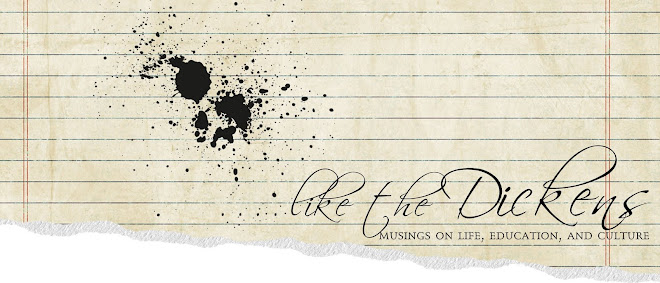I realized recently that I have done a surprisingly small number of movie posts of late in spite of all the good movies I watched in the recent past. I intend to remedy this tonight!
Recommendation numero uno:
Me and Orson Welles

Barrett and I heard about this movie back in December but missed it in the theater and have been waiting for it to come out on video. When that day finally came, we were not disappointed. We both agreed that this is one of the best movies we have seen in a long time.
The movie is about Orson Welles' early career in theater (post-radio and pre-film) directing Shakespeare's Julius Caesar in the early 1930s in New York. The acting in this movie will knock your socks off. Orson Welles is played by Christian McKay who we recognized in a Masterpiece Theater later (which proves he is actually, really good). More than once throughout the movie we had to stop and remind ourselves that we were not actually watching Orson Welles. The movie also stars Zac Efron who does an impressive job as a young high schooler who dreams of being an actor/singer/writer/artist, and his role in Wells' play is supposed to be his big break. Efron is both likeable and very believable in this role. I loved him! The plot of the movie centers around Welles' eccentricities professionally and personally as you watch the director of theater develop into the man that will direct the greatest movie of all time. There are some wonderfully smart references throughout the film to Orson Welles' work in Citizen Kane and The Third Man. The only complaint that I had with the film is that I think Richard Linklater (the director of the film and one of my favorite directors) could have done more artistic choices with the cinematography, but Barrett disagreed with me on that point. The movie is well-written, interesting, and engaging. I highly recommend this movie especially if you are a film history buff or a Citizen Kane fan.
Recommendation numero dos:
The Messenger

We heard about this movie watching the Oscars and loved it.
The Messenger stars Ben Foster and Woody Harrelson and is about the soldiers in charge of informing families when they have lost loved ones. As the subject matter suggests, the movie is very intense and very personal. The camera work, while hand-held, is effective at creating an up-close and personal tone at very intimate, intense moments. The chracters in teh movie are complex and dynamic, and the acting is stellar.
Recommendation numero tres:
An Education

This was another one we saw on the Oscars and had to see.
An Education takes place in England in the 1960s and tells the story of a young, naive girl who befriends a cultured, worldly man, falls in love with him, and gets a jarring lesson in life. The plot of the movie is very intriguing and takes a few small but unexpected turns. One of the best parts of this movie is definitely the sets and costumes; the clothes are to-die-for. The cinematography is also beautiful. Carrie Mulligan and Alfred Molina are awesome in this movie, but the real star of the show is Peter Sarsgaard as the playboy. His charisma wraps everyone in the movie including the audience around his little finger. Plot-wise, I think there were a few things that would have made th movie stronger: namely spending more time developing Jenny's (Carrie Mulligan's) relationship with her teacher and her relationship with her friends. But some of the deleted scenes help solve this. This movie is very enjoyable and engaging--a must see.
 A few years ago, I made a resolution to read a book a month in order to keep my mind fresh and to develop the habit of reading. I so enjoyed this new hobby that I decided to offer the same challenge to my students. And thus started Mrs. Freeman's 8th Grade Book Club. At the end of each month, those students that completed a book during that month get together during study hall, talk books, and partake of a little snack.
A few years ago, I made a resolution to read a book a month in order to keep my mind fresh and to develop the habit of reading. I so enjoyed this new hobby that I decided to offer the same challenge to my students. And thus started Mrs. Freeman's 8th Grade Book Club. At the end of each month, those students that completed a book during that month get together during study hall, talk books, and partake of a little snack.



















